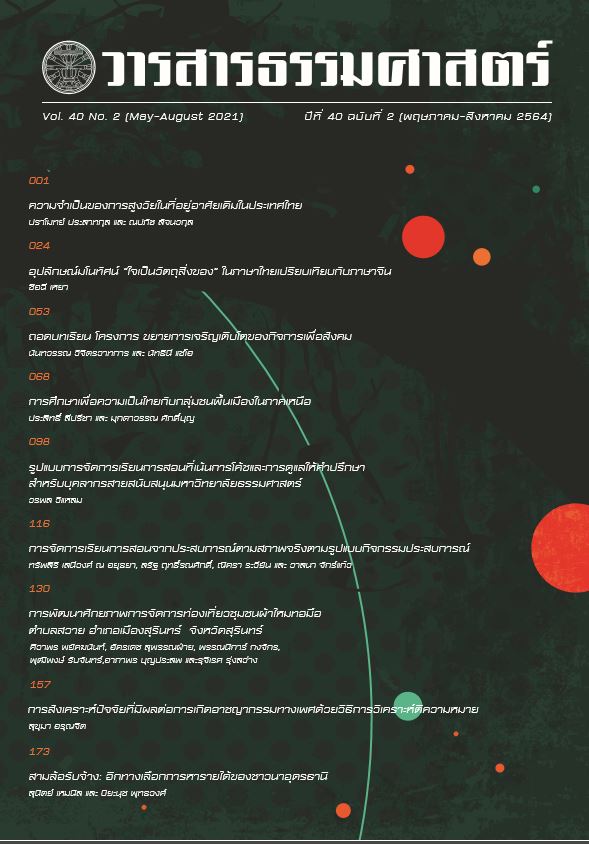Instructional Model Focusing on Coaching and Mentoring Support Personnel of Thammasat University
Main Article Content
Abstract
The objectives of this experimental research were: 1) to construct and find efficiency of Instructional model focusing on Coaching and Mentoring follow 80/80 standard criteria. 2) Compare learning effectiveness of academic support personal between pretest and posttest model focusing on Coaching and Mentoring. 3) evaluate the learner’s satisfaction. Which is a pilot study. The research sample were 18 academic support personal, that were selected volunteer from academic support personal form Thammasat University Rangsit Compus. The independent variables were Instructional model focusing on Coaching. The dependent variable was efficiency, learner’s satisfaction. The data were collected by 5 level questionnaires and analyzed by using SPSS for Window V. 13.0
The research results shown that the Instructional model focusing on Coaching and Mentoring had efficiency at (E1/E2) 81.59/82.63 that was higher than the criterion set of 80/80. The comparison of learning effectiveness of academic support personal between pretest and posttest shown that posttest mean score was higher than the pretest mean score with statistically significant level of .05. The learner’s satisfaction level after using Instructional model focusing on Coaching and Mentoring all aspect is very satisfying.
Therefore, Instructional model focusing on Coaching and Mentoring should be introduced as a guideline for Organize training for interested personnel in the future.
Article Details
References
Campbell, D. T., & Stanley, J. C. (1963). Experimental and quasi-experimental designs for research on teaching, Handbook of research on teaching.
Cronbach, L. J. (1993). Essentials of Psychological Testing (5th ed). New York: Harper & Row. Journal of Psycheducational Assessement September.
Likert, R. A. (1993). Technique for the Measurement of Attitudes. ARCH Psychological.
Kruse, K. (2009). Introduction to instructional design and the ADDIE model. Retrieved October 30 (date), from http://www,e-learningguru.com/articles/art2_1.html.
Dick, W., Carey L., and Carey, J.O. (2005). The Systematic Design of Instruction. 5th ed. New York: Addison-Wesley, Longman.
จิตณรงค์ เอี่ยมสำอางค์. (2555). การพัฒนารูปแบบการโค้ชทางปัญญาแบบเพื่อนช่วยเพื่อนเพื่อ พัฒนาสมรรถภาพการโค้ชและ การจัดการเรียนรู้ที่ส่งเสริมการคิดวิเคราะห์ของครูพาณิชยกรรม. วิทยานิพนธ์ การศึกษาหลักสูตรปริญญาปรัชญาดุษฎีบัณฑิต. สาขาหลักสูตรการสอน บัณฑิตวิทยาลัย มหาวิทยาลัยศิลปากร.
ชัยยงค์ พรหมวงศ์ (2556). การทดสอบประสิทธิภาพสื่อหรือชุดการสอน. วารสารศิลปากรศึกษาศาสตร์วิจัย, 5(1), 2556.
ดวงหทัย โฮมไชยะวงศ์. (2557). การพัฒนารูปแบบการเรียนการสอนที่เน้นการโค้ชและการให้คำปรึกษาแนะนำเพื่อส่งเสริมสมรรถนะครูประถมศึกษาของนักศึกษาวิชาชีพครู. วิทยานิพนธ์การศึกษาหลักสูตรปริญญาปรัชญาดุษฎีบัณฑิต. สาขาหลักสูตรการสอน บัณฑิตวิทยาลัย มหาวิทยาลัยศิลปากร.
ธัญพร ชื่นกลิ่น. (2553). การพัฒนารูปแบบการโค้ชเพื่อพัฒนาสมรรถนะการจัดการเรียนรู้ของ อาจารย์พยาบาลที่ส่งเสริมกาคิดอย่างมีวิจารณญาณของนักศึกษาพยาบาลในสังกัด สถาบันพระบรมราชชนก กระทรวงสาธารณสุข. วิทยานิพนธ์ปริญญาดุษฎีบัณฑิต. สาขาหลักสูตรการสอน บัณฑิตวิทยาลัย มหาวิทยาลัยศิลปากร.
วรพล วิแหลม. (2557). วารสารธรรมศาสตร์, 33(3), 2557.

